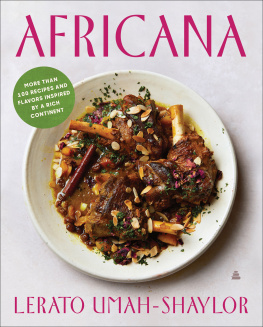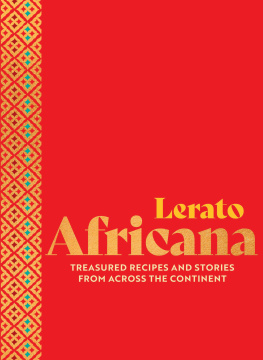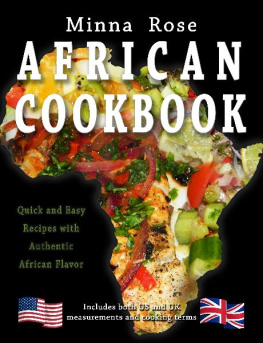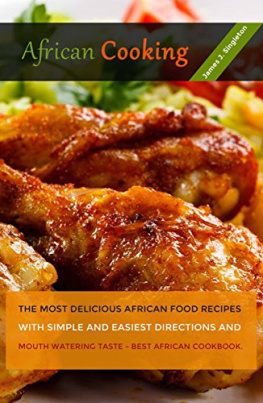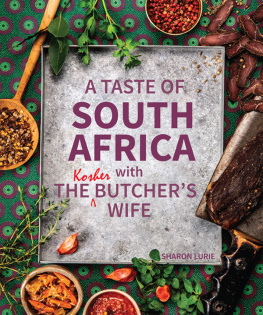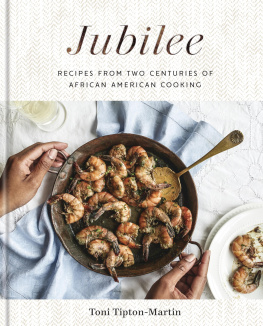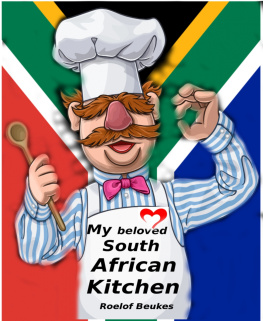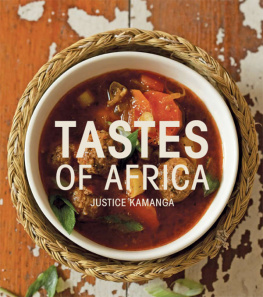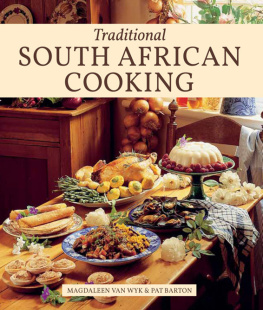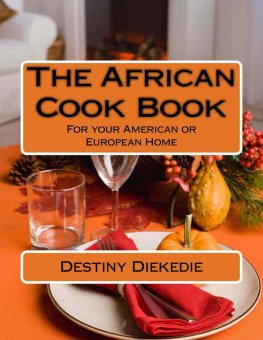Contents
Guide
For my mother, Stella Uchewho
blessed me with great curiosity and the
audacity to live out my dreams.
And for my grandma Theresa Ebonne,
I think she would have loved this book.
Contents
Africana is a celebration of modern African cookery, a love letter to a rich heritage and an enduring people. With whispered recipes from ancestors and generations past, memories of Mamas sumptuous cooking, soup-stained scribbles and inventive recipes for delightful home cooking, this book is my invitation to you to look to Africa for cultural and culinary enrichment, for an adventure filled with wanderlust and excitement. Bringing people together to share the joy of honest food with family and friends.
Imagine plucking fragrant and beautifully ripened mangoes, sinking your teeth into the sweetened flesh and saving the harvest for recipes such as mango piri piri or a cooling tropical salad with hibiscus syrup.
Listen to the soothing ocean waves crashing on the seashore in harmony with the sound of crackling fires, as you roast a fresh catch basted in apricot glaze, perhaps with a paste of makrut lime leaves and chilies, or the enthralling perfume of vanilla beans and rum.
Feel the comfort of stirring slowly as you mother a pot of luscious greens, or a sumptuous stew. Savor the spellbinding flavors of spiced tea, coffee and the pure decadence of delicious dark chocolate. This is the story of Africana, bringing the magic and beauty of vibrant African cooking into your home, wherever that may be, and transporting you to paradise.
This book tells the story of where I have come from and where I have been. You will discover the secrets of African cookingits rich diversity and shared traditions, its influence on world cuisine and its adaptability to your lifestyle, whether you are an amateur cook, a seasoned chef or a busy bee in need of vibrant ideas. I hope to inspire you with wondrous flavors and stories of passionate traditions as we travel across the continent one dish at a time.
Food has always been about much more than nourishment for my body; it is nourishment for my soul and a constant sensual adventure. From a young age, I was curious about flavors and this intensified as I ate my way through a colorful childhood to an even more exuberant adult life, with food taking center stage.
Growing up in Nigeria, food represented family; it was our favorite shared experience, at home, with friends, at celebrations and even in sad times. We show affection through food, and rejection of our food is often taken as rejection of our affection. Our feasts were never quick and simple; they were almost always lengthy and ceremonial, more so when we had guests. Food was often prepared with the neighbors in mind or an uninvited guest, of which there were many. A guest in an African home is treated like royalty, fed the best cut of meat, with the best crockery. As a child I thought our guests were utterly and annoyingly spoiled, until I realized we enjoyed this regal treatment as guests in the homes of others. I began to understand African hospitalitythe true value of sharing with others, the essence of togetherness and the personal reward found in making others happy, be it family, friends or strangers. As I traveled and explored more cultures, I also learned that this great pleasure in feeding others is not unique to Nigeria but is a way of life for many across Africa. In Senegal, for example, this sense of generosity and community is known as teranga.
If you see a man in a gown eating with a man in rags, the food belongs to the latter
FULANI PROVERB
My mother is the quintessential Africana, someone who beautifully embraces and celebrates cultures from across the continent. Although I am West African, from Nigeria, my mother gave me a Southern African name. Lerato means love in Sotho-Tsawna, a Southern Bantu language predominantly spoken in Lesotho, Botswana, and neighboring countries, and also one of eleven official languages of South Africa. Knowingly or unknowingly, she was preparing me for the pan-African life that I fully embrace. My brother and I spent a considerable amount of time living with family friends in the Republic of Benin, a francophone country just west of Nigeria, and we also traveled with Mum exploring and eating our way across Africa. We were raised mainly by our mother and spent some holidays and weekends at our fathers house in Lagos. Mums house was structured with daily meal plans, including an exciting variety of foods from across the world. Food was abundant and wonderful, which we thoroughly enjoyed. But what my mum called outside food, or street food, was completely off-limits. In Dads house, we had little or no structure; we ate lots of take away and street foods, which Mum would have found utterly horrificmarvelous food like and the most incredible fluffy cloud bread for breakfast. Although she didnt think so at the time, Mum admits now that it was a great experience for me, as it allowed me to explore beyond the food we ate at home. My mothers approach to fresh, home-cooked food has shaped my cooking style, but the freedom to explore beyond the home allowed me to discover and learn much more.
My mother was running a restaurant in her early twentiescarrying me wrapped around her backand I realize now that the apple didnt fall far from the tree! From a very young age, I started to develop an interest in food, beyond just eating it. I was so curious about how different ingredients could come together to create something truly wonderful. Even though my mother banned me from the kitchen until I was about 10 or 11 years old for fear of accidents, I never passed up an opportunity to sneak in there to dip my finger into the pots, risking a few burns just to taste what was to come. Papa, our family cook, put me to work, too, practically giving me my first job as his assistant chef, after much insistence on my part. I learned to cook intuitively, measuring by eye, by touchfeeling every grain of salt crushed between my fingersby taste and trusting my palate. My mother worked and traveled a lot, cooking mainly on the weekends. By my early teens, she finally invited me to cook with her, stressing the importance of learning to feed myself. But she was a little lateI was already convinced about the importance of cooking and was well equipped to cook an entire meal for the family, much to her amazement. Papa had taught me the basics of cooking rice and sauces and using the delectable curry spices and seasonings he sprinkled into the pots. Mum went on to teach me to cook more traditional Nigerian recipes, like , inspired by Nigerian fried rice.
When I started university in London, I was finally free to burn as many fingers as I wanted. I lived just by the South Bank in Waterloo and could be found almost daily crossing the bridge to dine in Covent Garden. I would eat out, come home and try to recreate what I had enjoyed, adding little twists here and there. Further south and a quick hop on the bus took me to Elephant and Castle, Camberwell and Peckham, where I would stock up on plantains, dried beans and spices. My parents practically bankrupted themselves to give me the best education, surely with the hope that I would make something of myself by becoming a world-renowned economist, which was the most natural expectation after graduating with a degree in economics, and with my keen interest in development. Although my mother was perplexed when I decided to immerse myself in the world of food instead, she has always been thoroughly supportive, even when it hasnt always been clear where this path would lead.

